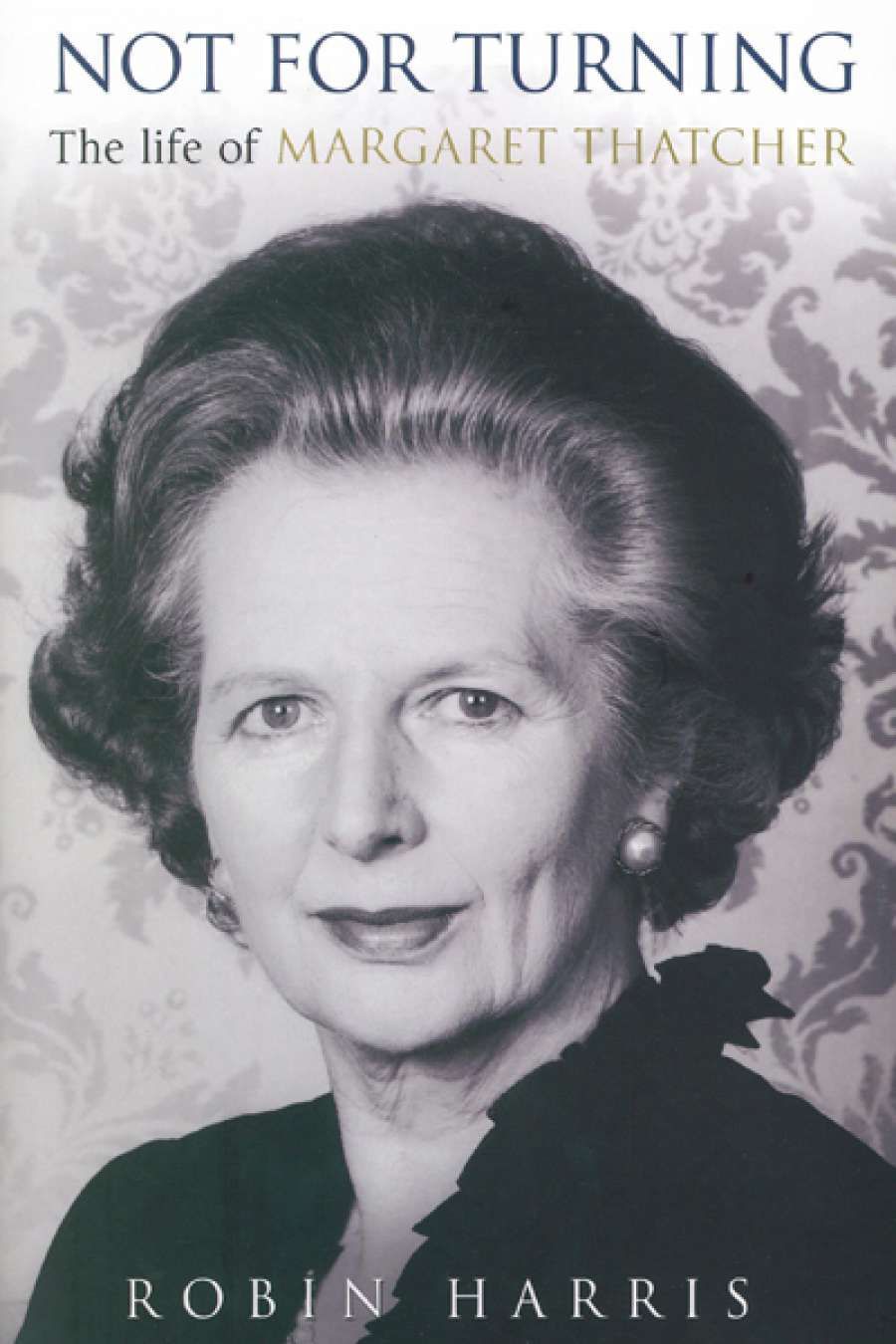
- Free Article: No
- Contents Category: Biography
- Subheading: The ad hoc premiership of a warrior queen
- Custom Article Title: James Walter on the new biography of Margaret Thatcher
- Review Article: Yes
- Article Title: Stage door Maggie
- Online Only: No
- Custom Highlight Text:
Our media treat leaders as personifying everything that matters, yet social scientists disdain leadership. Most of what we know about leaders comes from biographies. And biography, dominated by those wishing either to demonise, or to celebrate, their subject, is a craft monopolised by insiders, acolytes, and journalists. Regarding Margaret Thatcher, academics have discussed her premiership (1979–1990) in terms of economic change, social history, value transitions, and party decline. They display a disabling ambivalence over whether she was an agent or a manifestation of tectonic shifts. In parallel, there have been multiple biographies, the first published before she was defenestrated by her own party. A great deal, then, has already been written.
- Book 1 Title: Not for Turning
- Book 1 Subtitle: The Life of Margaret Thatcher
- Book 1 Biblio: Random House, $34.95 pb, 500 pp, 9780593072868
- Book 2 Title: Margaret Thatcher
- Book 2 Subtitle: The Authorized Biography (Volume One: Not For Turning)
- Book 2 Biblio: Allen Lane, $49.99 hb, 891 pp, 9780713992823
- Book 2 Cover Small (400 x 600):

The extremes of adulation and vitriol occasioned by Thatcher’s death in April 2013 remind us of what a profoundly divisive figure she was and of how intensely contested her legacy remains. Most prominent politicians, their work done, are left to the embrace of their followers. Even critics tend to mellow as age overtakes the icon – think Gough Whitlam, for example. But not Thatcher. Why has it proved so difficult to come to terms with her achievement? Can two new biographies help us to address these questions? Each was written with the consent of Thatcher and the stipulation that they not be published in her lifetime. They promise to reveal what could not previously be said. One is by an insider: a speechwriter and adviser to Margaret Thatcher, Robin Harris; the other – the ‘authorized’ biography – by a journalist, Charles Moore. Each is a true believer, convinced that Thatcher was a ‘great historic figure’, devoted to her legacy, and disdaining earlier critical biographies (such as Hugo Young’s pioneering One of Us, 1989) as ‘entirely hostile’. Yet both avoid untrammelled hagiography, and give us a persuasive register of her capacities, and of her weaknesses.
The story of Thatcher’s rise and fall will not surprise the politically engaged reader. Indeed, it confirms the insight and prescience of Australian political scientist, the late Graham Little’s brilliant essay on Thatcher in his Strong Leaders (1988). But it is a great story: Harris and Moore – whose accounts are largely consistent – give us the detail and anecdote that compels attention. It was the drama Thatcher generated that riveted public attention. It was her powerful personality and conviction that cut through. They were uniquely suited to the age of mediatised politics that coincidentally came to flower just as she stepped onto the stage (though neither of these authors gives sufficient attention to the role of the media in creating the Thatcher mythology).
 Margaret Thatcher with President Jimmy Carter at the White House, 1979
Margaret Thatcher with President Jimmy Carter at the White House, 1979
She saw herself as the champion of ideas, but it was her readiness for battle, her unflinching combativeness, that was truly extraordinary. ‘She did not have,’ says Moore, ‘an intellectually orderly mind; nor did she have an original one … [S]he was a sort of a “stage door Johnny” for the ideas of others – admiring, over excited. But this was not … a handicap.’ She was a magpie, driven by a sense of shame about what had happened to her country, insisting that ‘something simply had to be done’, and picking up anything that suited her purpose. A cohort of the new men, advocates for the monetarist antidote to Keynesianism and welfare statism, saw their opportunity and gave her ammunition.
‘Thatcher – neither a strategic nor a systematic thinker and always so focused on the next battle that she ignored the long view – simply cobbled it together on the run.’
An overview of her project, provided by Harris at the end of his book, gives it a retrospective coherence that encapsulates what became known as Thatcherism. This overlooks just how ad hoc it was, and how Thatcher – neither a strategic nor a systematic thinker and always so focused on the next battle that she ignored the long view – simply cobbled it together on the run. Moore remarks that this ‘most missionary of all modern prime ministers never sat down to define her mission or plan its implementation’. This proved immensely frustrating to the real architects of neo-liberalism, long-term advisers (such as John Hoskyns) and economically literate monetarists in Cabinet (like Reggie Maudling, Geoffrey Howe, and Nigel Lawson). But it was held together by the warrior queen whose conviction that she knew best generated the contradiction inherent in her government: it was prepared to make huge authoritarian interventions into the institutions of common life in the name of freedom and choice.
Moore’s account is wonderfully evocative of what encounters with Thatcher must have been like. Her practice of setting the terms of policy discussion by expressing opinions more trenchant than those of her colleagues; her resolution ‘that I should not depart from my convictions by one iota’; her command of a brief, disconcerting those less given to her habit of overwork; her belief that she was the bearer of an idea whose time had come; her peremptory demand, ‘I know the what; tell me how!’; the sense that she simply needed to fight harder if everyone disagreed with her; her tendency, under stress, to avoid capture by hurrying down the byways of minutiae; and her conclusion that ‘the day that I am not causing controversy, I shall not be doing very much’ enabled her simply to override those – the majority – more conscious of their limits.
It was these capacities that made her so formidable; they also led inevitably to her downfall as the catalysts for cohorts of the resentfully marginalised – the architects of reform who, having made their contribution, were overlooked and with their ambitions disappointed – became bitter rivals. Kind to her subordinates, a good friend to those whose loyalty was unquestioned, empathetic and non-judgmental with those in crisis (she was, after all, the crisis expert), Thatcher won the loyalty, affection, and protectiveness of her staff (always worried by her proclivity for going over the top though all guns were against her). But in the political arena proper, she was intensely task-oriented, every relationship was instrumental, and those found no longer fit for purpose were savagely criticised or dispensed with. This lack of emotional intelligence ensured that her fundamental battles were not only with the Opposition, and with progressives, but within her own party. For her, whose world view was structured in terms of conflict, it may have seemed no more than a self-fulfilling prophecy: the backlash of the benighted. But it is, as these books make apparent, the deep divisions she left within the Conservative Party that have ensured that her legacy has not been easily assimilated.
Harris, who covers the whole career, is brief, less than insightful (and, in a crucial respect, wrong) about Thatcher’s childhood, youth, and early adulthood. He dismisses more probing analyses as ‘psychobabble’ on the astonishing ground that Thatcher herself wouldn’t have been interested (for whom, one wonders, is this book being written?). What he gets wrong is revealing: he asserts that Denis was Margaret’s only suitor, thus missing one of the most telling instances of her bossy conviction that she knew what was best for others. For, as Moore (the better researcher) shows, there had been two earlier suitors, and when she found the one who had seemed most likely not quite adequate, she decided instead that he was just the thing for her older sister, and contrived their meeting and eventual marriage. Her exercise of authoritarian intervention, then, was pioneered domestically before being turned on the political world. However, Harris is much better on politics and the Thatcher program, and his thematic treatment of its elements – monetarism, war, the Cold War/international relations – is a good primer for those interested in an overview.
 Thatcher on a visit to India, Denis in tow, sharing a sunshade with Indira Gandhi. April 1981.
Thatcher on a visit to India, Denis in tow, sharing a sunshade with Indira Gandhi. April 1981.
(From Not for turning)
Moore’s longer examination takes us only to 1983 (his second volume is to come). It nonetheless repays the time and attention his detailed and more chronological approach demands. The fascinating discussion of the Falklands war alone is a standout, with all the drama, tension, and heart-stopping moments we have come to celebrate in fictions like the television show Borgen. And it ends with a marvellously apt depiction of Thatcher, definitively transcending her gender, as the lone woman in a hall full of adulatory senior servicemen from the Falklands taskforce (their spouses having been excluded in an adjoining room) rising to say ‘“Gentlemen, shall we join the ladies?” It may have been the happiest moment of her life.’
We are yet to see what Moore will conclude, but Harris finally makes a sterling effort to address the critics of Thatcherism, arguing that adverse social changes had little to do with what was essentially an economic program, that Conservatives themselves, in not coming to terms with her achievement, have contributed to the many misunderstandings of what it was all about, and that she is hardly to be blamed for unintended consequences (most, anyway, contrived by less able successors).
In response, one might turn to the reflections of an unlikely analyst of the Thatcher effect, comedian Russell Brand. A child of her era (born in the year she became party leader, and aged four when she became prime minister), he commented soon after her death: ‘what is … troubling is my inability to ascertain where my own selfishness ends and her neo-liberal inculcation begins. All of us that grew up under Thatcher were taught that it is good to be selfish, that other people’s pain is not your problem, that pain is in fact a weakness and suffering is deserved and shameful. Perhaps there is resentment because the clemency and respect that are being mawkishly displayed now by some and haughtily demanded of the rest of us at the impending … funeral, are values that her government and policies sought to annihilate.’ When will we come to terms with the Iron Lady?


Comments powered by CComment